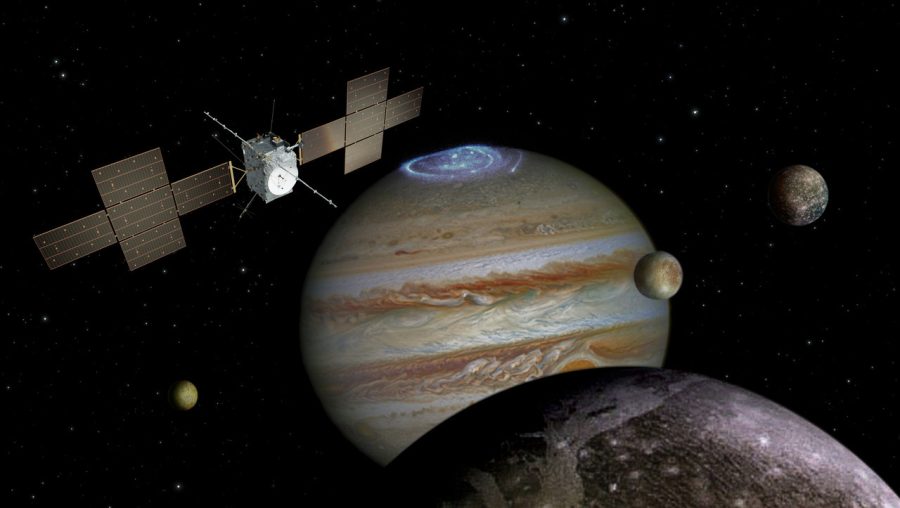Space Mission Juice Launches Toward Jupiter
The Juice space mission, created by the ESA, is launched on a 8 year mission to explore Jupiter and its moons. Astronomers across the world are interested to see what this spacecraft will discover.
April 18, 2023
At 8:14 am EST on Friday, April 14, the Jupiter Icy Moons Explorer mission began its 8-year journey to Jupiter. The European Space Agency launched the Juice (Jupiter Icy Moons Explorer) spacecraft in hopes of exploring Jupiter and its three largest moons. The moons Europa, Ganymede, and Callisto will all be examined to see if there are life sustaining oceans beneath the icy surface.
The Juice mission first found inspiration when astronomer Galileo Galilei began looking at Jupiter through his telescope in 1610. After discovering the planet and its surrounding moons, fascination started to spread through generations. Sophomore Sawyer Graham said, “I think space exploration is super cool. My favorite planet is Neptune, but I love learning about all of the planets and space missions. Space is scary, and endless, but that doesn’t stop me from being interested.”
Due to previous missions to Jupiter’s moons, it has been discovered that oceans lie beneath the icy surface. These bodies of water are much larger than Earths are, which might suggest that life is present within them. Within Earth, life is found in the deepest parts of oceans by surviving near hydrothermal vents. The question is asked, “Could life similarly evolve and survive in the ocean floors of these moons?” by Jatan Mehta, writer for The Planetary Society.
The full trip of the spacecraft will be eight years of travel to the moons and planet, followed by a three year search and exploration. In the eight years of travel, Juice will complete a Venus flyby and two Earth flyby’s before landing on Jupiter’s surface. The spacecraft is built with heavy insulation to protect the internal temperatures. The external temperatures can reach more than 250℃ when passing by Venus, and be followed by -230℃ when landing on Jupiter.
Over the first 17 days of launch, Juice will deploy multiple antennas and instruments to study the environment of the planet and moons. After the initial period, there will be a three month period of testing and preparing the instruments.
This mission is very important to present and future space travel as it explores a planet in depth that hasn’t been explored before. Juice will investigate the planet’s gaseous surface in depth, along with the icy saltwater ocean moons. The head of the European Space Agency, Josef Aschbacher spoke on the launch, “This is one of the most exciting missions we have ever flown in the solar system, by far the most complex.”
The Juice mission is to make new discoveries through Jupiter and its icy moons. With the help of NASA, JAXA and Israel Space Agency, this exploration can happen.











